|
Christopher Gunning is mainly known as the composer of such beautiful scores as When The Whales Came (1989) and Firelight (1991), but his professional career, from the sixties to nowadays, includes commercials jingles, arrangements for a large number of great artists, films and TV, along with a collection of concert works, among others. According to this, he can be considered a great composer in British music.
Apart from being the composer of such famous classic theme as Martini commercials', collaborating in legendary projects as Hammer's, or conquering half of the world with his notes for Agatha Christie’s Poirot TV series, Christopher Gunning is making history by achieving several of the most prestigious music awards. Here you have the interview he nicely granted to us, where you'll find more about a career full of interesting works and anecdotes including such great names as Sir Richard Rodney Bennett and John Scott.
 BSOSpirit (BS): Let us start by inquiring into the sources of your magnificent career. Somehow, you ought to be a musician. Was it because of your parents? Was it because there was always a piano at home? Did other things rose then your enthusiasm as a kid? Was there any sort of calling? Please, think retrospectively. BSOSpirit (BS): Let us start by inquiring into the sources of your magnificent career. Somehow, you ought to be a musician. Was it because of your parents? Was it because there was always a piano at home? Did other things rose then your enthusiasm as a kid? Was there any sort of calling? Please, think retrospectively.
Christopher Gunning (CG): My mother and father had both been musicians but had abandoned their careers. Of course there was always music in the house and I started composing my own pieces at a very early age. Somehow I was always going to be a composer - apart from anything else, I was useless at all other subjects!
BS: Your skills seemed to develop very steadily while learning music at the Guildhall School. Then you met distinguished guardians such as Sir Richard Rodney Bennett, and you moved to the Durham University... Is there any teacher or any lesson that can be now evoked with pleasure?
CG: My studies for the Durham exams were in London - I merely attended the university to sit the examinations. At the Guildhall, my favourite teacher was Brian Trowel, a very lively musicologist, and with him I studied music from its first beginnings right up to the present day. Later, I had several lessons with Richard Rodney Bennett - and they were particularly stimulating because of his wide interests in contemporary music from Boulez to jazz.
BS: Didn't you start by arranging the songs of very renamed artists?
CG: My first professional engagements were for commercials. I was recommended for something by a friend, John Scott, who was too busy to take in the job himself. I will of course be eternally grateful to John for this! It led to other commercials, and I also started doing arrangements for some singers. Jackie Lee was the first - later on Cilla Black, Shirley Bassey, Colin Blunstone, the Hollies, and the last was Mel Torme.
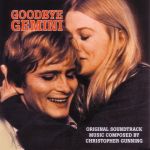 BS: Your first score was written in 1970: "Goodbye Gemini", a somber story about two brothers who end tragically. Who hired you to write the music for that film? Did you think at that very moment to proceed in your career as a film composer? BS: Your first score was written in 1970: "Goodbye Gemini", a somber story about two brothers who end tragically. Who hired you to write the music for that film? Did you think at that very moment to proceed in your career as a film composer?
CG: I had already composed the music for several documentary films before "Goodbye Gemini" came along, and I certainly knew that I wanted to be a film composer. The commission came on the recommendation of my (then) agent, Liz Keyes at London management. The producers and the director wanted someone who was young and new.
BS: By the way, "Goodbye Gemini" has been edited and released as a CD. I wonder if you would have liked to see other unpublished works being edited as well.
CG: Of course! Most of my best music is unavailable. It is desperately frustrating.
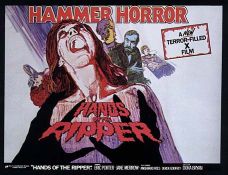 BS: You also happened to score Hammer's "Hands of the Ripper". What sort of memories do you keep from that experience? Did you merge with other Hammer composers, such as James Bernard? BS: You also happened to score Hammer's "Hands of the Ripper". What sort of memories do you keep from that experience? Did you merge with other Hammer composers, such as James Bernard?
CG: No, I never met James Bernard or any other Hammer composers. I was engaged by Philip Martell. As their music supervisor he looked over every score before it went to the copyist, and he asked for frequent alterations. I found this very irritating because I did not always agree with his suggestions.
BS: Three decades have past. Would you still be facing those projects in the same way you did?
CG: No. My working methods have changed 100%. Nowadays I work with computers, have the film at home, and compose the music in synchronization with the film. In those days there was no practical way of having the film, so I had to go along to the cutting room and try to remember each shot.
Musically I've changed too. I hope I have improved (!) but in any case I think the music I write now is more carefully crafted to fit the film.
BS: In 1987 you won your first BAFTA award for "Porterhouse Blue", a TV series about living in Cambridge. You wrote that score together with Rick Lloyd. Did you match well as artists? According to you, what was the most attractive feature of that score? Do you think that this is why the score was awarded?
CG: The score was unusual in that it relied almost completely on male vocal sounds. This was not Rick Lloyd's idea, nor mine. It was Brian Eastman's idea (the producer). Rick Lloyd had already composed the title theme when I became involved. I added the boy's voices and the instrumental accompaniment. Then I composed all the incidental music - Rick Lloyd had no involvement in that at all.
BS: In "When the Whales Came" music certainly played a very important role... How did you face this particular challenge as a composer? Did you figure out what parts of the film deserved more emphasis?
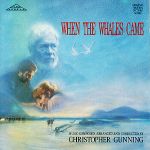 CG: I was on holiday in the Scilly Isles with my family and saw that a film was being made on the next island. But I never met anyone involved in it during my holiday. When I arrived home, my agent told me that I was being considered as someone to write the score - an incredible coincidence! I warmed to it naturally, having loved the scenery in the Scillies. It was important to have music with a mysterious beauty, and that's how I arrived at female voices and hushed strings with, periodically, an enchanted flute. I worked very closely with the director in establishing which scenes had to be grand and which should be quietly evocative. I also used some folksongs at appropriate moments. I loved working on the film - but it wasn't easy! CG: I was on holiday in the Scilly Isles with my family and saw that a film was being made on the next island. But I never met anyone involved in it during my holiday. When I arrived home, my agent told me that I was being considered as someone to write the score - an incredible coincidence! I warmed to it naturally, having loved the scenery in the Scillies. It was important to have music with a mysterious beauty, and that's how I arrived at female voices and hushed strings with, periodically, an enchanted flute. I worked very closely with the director in establishing which scenes had to be grand and which should be quietly evocative. I also used some folksongs at appropriate moments. I loved working on the film - but it wasn't easy!
BS: The film, in fact, won a nomination for the Anthony Asquith awards of the British Academy. Could it have won more credit if it had worked out better in the theatres and among the public?
CG: It's always the same - films which are financially successful get noticed for their music (good or bad) and those aren't have their music ignored.
BS: In "The Big Battalions" (1992) you worked with producer Brian Eastman in a story about religious fundamentalism and intolerance. That score brought also two nominations for the BAFTA awards. Could you comment on that experience?
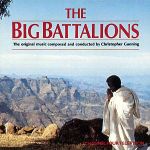 CG: In "The Big Battalions" we had separate kinds of music for the different religions. This helped to organize the score a great deal. It was a fabulous opportunity for music and I have always been quite pleased with the result. CG: In "The Big Battalions" we had separate kinds of music for the different religions. This helped to organize the score a great deal. It was a fabulous opportunity for music and I have always been quite pleased with the result.
BS: Brian Eastman was perhaps your best talisman... With him you won two BAFTAs, two Ivor Novello awards and some more nominations. Was it because of this profitable relationship that you were hired again to score "Agatha Christie's Poirot"?
CG: It's true that my association with Brian had already been very successful - in fact he asked me to write "Poirot" the very same evening I won the BAFTA for "Porterhouse Blue". It was a great evening!
BS: "Poirot's Theme" is a nice and precise musical portrait of that famous detective, played in here by actor David Suchet. How did you conceive the notion? Did the film crew suggest any idea about the music to be played in that case?
CG: Brian Eastman and I discussed various possibilities for "Poirot" and then I came up with 3 possible themes. Brian chose no 3. There were a lot of considerations regarding the music - it had to be "continental", witty, and also somehow reflect the period, while being dark and slightly sinister. We tried it first on a soprano saxophone but it was too light and jaunty somehow. So we then tried it on an alto saxophone, and I simultaneously came up with the accompaniment as we know it today.
BS: If I'm not wrong, that TV series started in 1989 and it is still running, with about 60 episodes that have been mainly scored by you. This also brought another BAFTA award to your collection... However, the first musician involved in the series was Richard Newson, and then Fiachra Trench. Why did they change to you?
CG: That's not right... I did the first series, but not series 2. This was because I had already committed myself to "Yorkshire Glory" and it was impossible for me to do both. So Brian and I decided on Richard and Fiachra to write series 2.
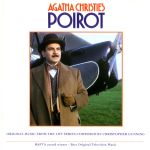 BS: Before showing on TV, Poirot had already been present in some big screen productions, such as "Death on the Nile" or "Evil under the Sun". In those cases, the music was carried out by Italian composer Nino Rota, or was rather based in some standard songs by Cole Porter... Did those musical landscapes inspire your further work for the series? BS: Before showing on TV, Poirot had already been present in some big screen productions, such as "Death on the Nile" or "Evil under the Sun". In those cases, the music was carried out by Italian composer Nino Rota, or was rather based in some standard songs by Cole Porter... Did those musical landscapes inspire your further work for the series?
CG: No! I didn't watch those films prior to working on "Poirot". I had seen "Murder on the Orient Express" by Richard Rodney Bennett, but it is clear that I wasn't influenced by his score at all.
BS: Some of the latest chapters of this series seem to obviate the main theme. For any reason?
CG: Oh - the new producers (Brian Eastman was no longer working on the series) felt that it was important for Poirot to change. They wanted to make it much darker than before, and they wanted each film to look like a full length feature film with its own identity. So they decided that it would be wrong to use the theme. I thought it an OK decision at the time, but now I am not so sure.
BS: In fact, your collaboration with the Poirot series ended in 2004, with "The Hollow". After that, it was Stephen McKeon who took the lead. Did you quit for any special reason?
CG: Yes. My new wife was seriously ill, and I wasn't well either. It seemed best to have a break from working at great intensity for a while.
BS: What did this long involvement in the Poirot series bring to you as a composer?
CG: Gosh! It made me write more quickly than I'd ever had to before. I also developed a "style" for the programmes. And because they have become so popular, they have been financially quite rewarding. Actually, I think I developed musically quite a lot - the more recent scores are (I hope) better than the first...
BS: Isn't it true that you helped Sir Richard Rodney Bennett in the making of a score for "Nicholas and Alexandra"? Were then those nominations to an Oscar and to a Grammy creditable to your work?
CG: I wrote some of the dance music and military band music for Nicholas and Alexandra. He did the main score and deserves the entire credit for the remarkable score.
BS: Your third BAFTA award came in 1994 with the music of "Middlemarch", written together with Stanley Myers. What can you evoke from that experience?
CG: Stanley wrote the title music and the incidental music for episode 1. Then, very sadly, he died. I was called in to complete episodes 2 - 6. I used his themes where I could, but inevitably had to invent a lot of music of my own. It was eerie composing the music with Stanley's scores in the corner of my room. I was very fond of him.
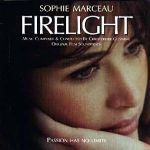 BS: "Firelight" marked another turning point in your long relationship with producer Eastman. Why did you choose that particular project? BS: "Firelight" marked another turning point in your long relationship with producer Eastman. Why did you choose that particular project?
CG: I liked the script - the subject matter. I had always wanted to score a big romantic movie. I thought there was room for plenty of emotion in the score.
BS: Why did you put the violin as a main musical source in the "Firelight" score. Didn't it bring a sad, nostalgic impression? Was this what you wanted?
CG: Absolutely. For considerable portions of the film there are strong emotions which cannot be expressed by the characters. The music says that which the characters cannot. The violin is one of the most expressive instruments, and that's why I chose it.
BS: Themes such as "The Lake House", "Learning by Firelight", "Loving by Firelight" or "A New Journey" are beautifully played and evocative of many emotions. Did you work together with William Nicholson in the making of these particular pieces?
CG: Yes. He came to my house several times to hear the music. We had a very good working relationship.
BS: Let me insist that "Firelight" reached an excellent empathy with the film... Did you visit the places were the film was shot? Did you work close to the script? In what part of the making did you join the film production?
CG: I saw a rough cut fairly early on. I never visited any of the sets, however. I worked to a fine cut of the film, but then the film was shortened due to pressure from the American distributors. I re-recorded the music all over again, and then made some further alterations when the film was recut yet again.
BS: In 1977 you scored a TV film adaptation of Daphne du Maurier's novel "Rebecca". Did you bear in mind the work of Franz Waxman in the Hitchcock film?
CG: No. I decided it would be best not to hear the original. I didn't want to be influenced in any way by it.
BS: "Rebecca" made you win an Ivor Novello award, given together by the British Academy of Composers and Songwriters and The Performing Right Society. Considering all the awards that you have been collecting in all those years, what is the most meaningful to you? Which one do you now remember with more satisfaction?
CG: I am proud to have received so many awards and nominations, but really one has to realise that they are not necessarily awarded to the best scores every time. It's important to keep your own powers of self-judgment. Some of my best scores have not received any accolades. And sometimes I see awards given to scores which are, in my opinion, definitely not the best! If you make me choose one for myself - then it would have to be "Poirot". I remember the evening on which I was presented with it with enormous pleasure.
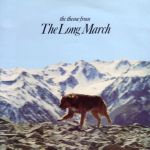 BS: "The Long March" deserved an Ivor Novello nomination. It was surely one of your most lively compositions. The profits of the record were also addressed to a noble cause. Could you comment on that specific work? BS: "The Long March" deserved an Ivor Novello nomination. It was surely one of your most lively compositions. The profits of the record were also addressed to a noble cause. Could you comment on that specific work?
CG: This was originally composed for a commercial for dog food! The film featured thousands of dogs running over hillsides to get their dinner. Curiously, when I first played the demo to the creative team, one crucial member didn't like it. Nevertheless I persevered with the idea and when everyone heard it with the full orchestra they thought it was great...
The music had to have a "pied piper" feeling to it - starting small and growing irresistibly. It's kind of crazy, but I still like it...
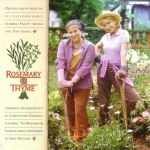 BS: Brian Eastman also wanted you for another series: "Rosemary & Thyme", still a thriller, but with a loving guitar (played by John Williams) instead of a saxophone (used in Poirot's episodes). Did you plan something different? Did you want to try any new thriller formula? BS: Brian Eastman also wanted you for another series: "Rosemary & Thyme", still a thriller, but with a loving guitar (played by John Williams) instead of a saxophone (used in Poirot's episodes). Did you plan something different? Did you want to try any new thriller formula?
CG: We wanted to create something traditional and "English". We also needed to use fragments of the traditional song "Rosemary and Thyme". It seemed natural to use a guitar as the lead instrument, and I very much liked the idea of using the great John Williams, who I have worked with before, to play it.
BS: Do you agree to include some film dialogues in a CD with the original soundtrack?
CG: Yes - I think it makes for a more evocative soundtrack.
BS: Did you ever work with composer John Scott?
CG: John is a great friend. I once did an arrangement of his song "Love is Now" for Jackie Lee - it was a long time ago! I also helped produce a couple of his scores. He has always been very encouraging to me.
BS: Your scores are often related to old ages, to the past, to historical stories... Is it more comfortable to write a music for scenes of the past than to create a music for the present tense or the future?
CG: I'm not sure that you're right. Some of my scores have been for "period" pieces, but others have been for contemporary dramas. I like to do both. Naturally, it is easier, in some ways, to fall back on another composer's style, but even that creates its own problems. Every project has its own parameters, and one has to tackle each one with a clean sheet.
BS: Your music has also attracted some important commercial brands who wanted their adds to be scored by you... Martini, Lloyds Bank, Kleenex, Polaroid. How does it feel to write a score for an advertisement? Is it a good experience?
CG: I used to write a lot of commercials, but haven't done any for years. At the time, in my 20's, they gave me valuable experience. Musically it can be quite challenging to come up with the perfect piece in only 30 seconds - it certainly teaches you to be "to the point". Ultimately, though, I get more satisfaction from working in longer forms.
BS: You also scored an amazing BBC documentary film titled "Wild Africa". How different is it, for a composer, to work for a fiction project or a documentary film?
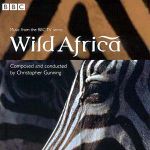 CG: I don't think there is a big difference. The purpose of music is to create mood, drama, and atmosphere. The task always is to discover the drama in the film and then compliment it with music. CG: I don't think there is a big difference. The purpose of music is to create mood, drama, and atmosphere. The task always is to discover the drama in the film and then compliment it with music.
BS: Some school teachers use your material written for "Wild Africa" as a means to learn creative dancing and to create a mood for thinking time. Children, even those who do not show an interest in music quite often, seem to like especially a part named "Animnal Conflicts". Would you consider that as a a homage to your composing skills?
CG: Well, it's nice to know this sort of thing happens, and if children react well to my music - that's great! As to my composing skills - you had better be the judge...
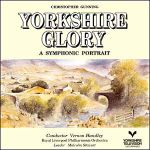 BS: "Yorkshire Glory" is a symphonic portrait. Was it written for any special occasion? Could you comment on that work? BS: "Yorkshire Glory" is a symphonic portrait. Was it written for any special occasion? Could you comment on that work?
CG: This was an exciting comission from one of the main regional companies. They wished to make a 50 minute film celebrating all that is remarkable about Yorkshire. I composed the music, and then the film director went out with his camera and made a film inspired by the music. The completed film was shown on network ITV, but also performed live at Leeds Town Hall.
BS: Let us talk about your Concert for Piano and Orchestra. Olga Dudnick made an splendid performance, by the way... What's your favorite part of that work?
CG: Probably the slow movement. And yes, Olga is a great pianist.
BS: From where did you get your inspiration in order to write "Storm"?
CG: It was a violently windy day on the South coast here in England. I could hardly stand up against the wind - and there seemed to be an atmosphere of brutality. I thought this would be a great starting point for a piece...
BS: Why did you structure the whole "Symphony n. 1" in one single theme of 24 minutes, instead of dividing it in a few parts?
CG: I am interested in the "narrative" in music. Put simply it is telling a story by the use of themes, motifs, etc. I suppose it is something that a great many other composers have attempted in the past, for example, Strauss and others in their tone poems. But there are no extra-musical characters in my music and one is free to interpret the pieces according to one's own experiences.
BS: In 1994 and 1998 two essential albums were released containing some of your works both for the big screen and television. But there are also many scores that have never been published, with some others which are difficult to find. Can there be a chance to see all your work being released on any CD collection, or some of your unpublished material?
CG: I wish it could be possible. Record companies in general do not appear to be interested. The only possibility, really, is for me to do it myself...
BS: Some speculate that you have been asked to score a biopic film on French singer Edith Piaf. Is that true? Could you tell us anything about this project?
CG: Yes, I am working on the film, and at the moment it is called "La Môme". I'm excited about it. So far we have recorded some songs, but I haven't started the main score yet. I'll be doing that during August. The director is Olivier Dahan, and Marion Cotillard plays the title role.
BS: How would you define yourself: a symphonic composer, a romantic, a classicist?
CG: Sorry, but I can't define myself! I try to do everything... whether I succeed or not is debatable.
BS: Interestingly enough, there's a section in your own web page, www.christopher-gunning.co.uk, dedicated to whoever want to become a film musician. Do you think that there is really enough room for a nice future in this kind of musical art?
CG: No - I worry that the great days of television are over. Budgets are being cut everywhere, and drama on TV is not of the high quality it was ten or twenty years ago. I wouldn't encourage newcomers into the business unless they are prepared for some difficult times.
BS: I'm sure we could talk for hour about the music you wrote for so many scenes, but everything needs to be stopped at some time or other... It has been a great pleasure and a honor to interview one of the great masters of British film music. We thank you then very much for your patience and your kindness. We wish you the best, and look forward to seeing you involved in other musical projects.
CG: Thank you!!!!
Interview by Felipe Múgica, Heriberto Navarro and Asier G. Senarriaga
|





